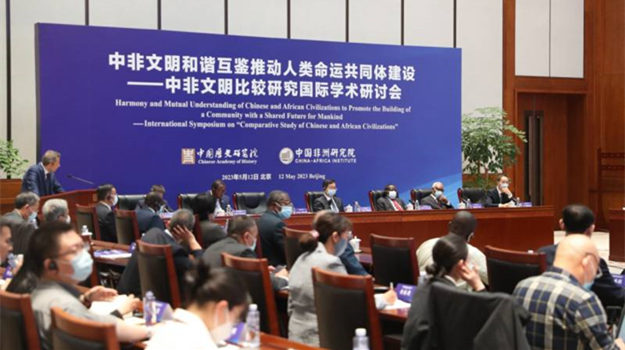


A scene of the conference Photo: Dong Jiacheng/CAI
At an international symposium on “Comparative Study of Chinese and African Civilizations” convened in Beijing on May 12, Chinese and African scholars criticized eurocentrism in the study of Africa’s history and proposed viewing African history and civilization as well as the China-Africa relationship objectively and comprehensively.
Gao Xiang, president of the Chinese Academy of Social Sciences (CASS) and also director of the Chinese Academy of History (CAH) under CASS, noted in his speech that Chinese and African academics face the common task of telling the true history of China, Africa, and the world to the people.
Historiography is an important technique for accumulating historical experience and a key vehicle for mutual learning between civilizations. Gao said that compiling a general history of Africa that presents the real historical landscape of the continent and contains rich connotations of African civilization can not only improve China’s research on African history, but also help readers acquire a full understanding of how African history developed. Moreover, the compilation can foster correct views on Africa and China-Africa cooperation, enrich outcomes of bilateral people-to-people exchanges, and promote joint development amid mutual learning, contributing insights and power to the building of a human community with a shared future.
Though far apart, China and Africa enjoy a long history of exchanges. In ancient Chinese documents, there are many accounts of Africa, from renowned Han-Dynasty historian Sima Qian’s Shi Ji (Records of the Grand Historian), which documents Han-Dynasty diplomat Zhang Qian’s mission to the “Western Regions,” to Jing Xing Ji (Notes on Travels) written by Du Huan of the Tang Dynasty, to Ling Wai Dai Da (Notes from the Land Beyond the Passes) by Zhou Qufei of the Song era and his contemporary Zhao Rukuo’s Zhu Fan Zhi (Description of the Barbarians), to Xing Cha Sheng Lan (Overall Survey of the Star Raft) by Fei Xin of the Ming, and further to Qing-Dynasty scholar and politician Lin Zexu’s Si Zhou Zhi (Encyclopedia of Four Continents) and Wei Yuan’s Hai Guo Tu Zhi (Illustrated Introduction to Countries over the Seas). These documents reflect the process of gradual mutual understanding, deepening exchanges and mutual learning between the two ancient civilizations over history.
After the 15th century, Africa and China shared similar historical experiences. For example, they were successively subjects of aggression at the hands of Western colonists. Colonial historians claimed that Africa had no history of its own or that African civilization had foreign origins, exerting long-term negative influences on African historical research.
Africa’s history was written by Westerners, and is therefore fraught with bias, said Peter Kagwanja, director of the Africa Policy Institute in Kenya, adding that their depictions of Africa-China exchanges are likewise discriminatory and biased.
Nkolo Foé, a professor from the University of Yaoundé in Cameroon, noted a lack of recognition of African and Chinese civilizations among some Western scholars, which he ascribed to their insufficient and superficial knowledge of the two diverse cultural systems. He called for efforts to shatter these preconceptions by conducting related research from scratch.
In 2021, the China-Africa Institute (CAI) under CASS launched a project to recompile a multi-volume general history of Africa. Somali Ambassador to China Awale Ali Kullane said that China’s compilation of the multi-volume general history of Africa can break the monopoly of Western narratives on African history and diversify historical accounts of Africa.
The project is underway and several sub-projects are progressing smoothly.
The international symposium was co-hosted by CAH and CAI.